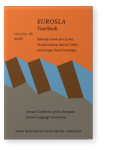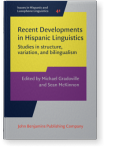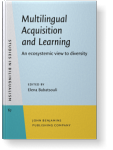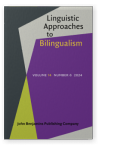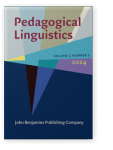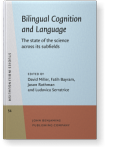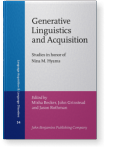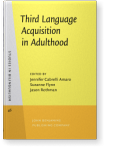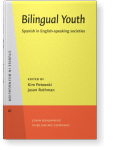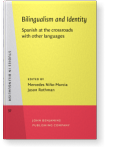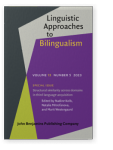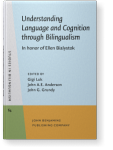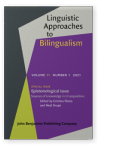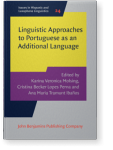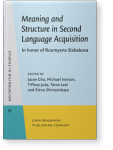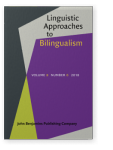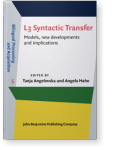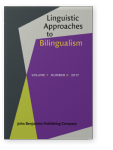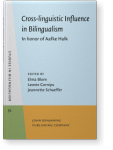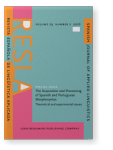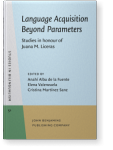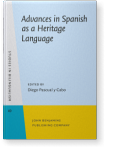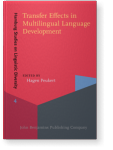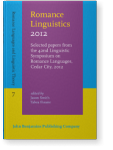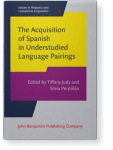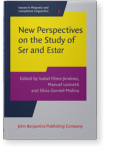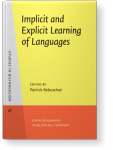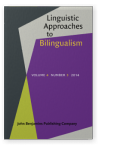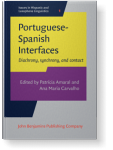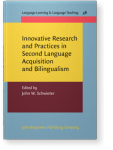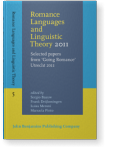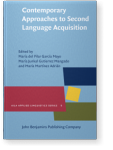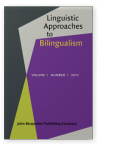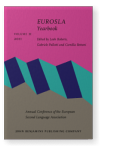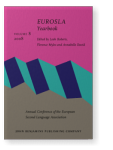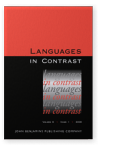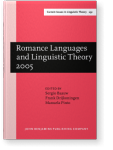Jason Rothman
List of John Benjamins publications for which Jason Rothman plays a role.
Yearbook
Book series
ISSN 2213-3887
Journals
ISSN 1879-9264 | E-ISSN 1879-9272
ISSN 2665-9581 | E-ISSN 2665-959X
Bilingual Cognition and Language: The state of the science across its subfields
Edited by David Miller, Fatih Bayram, Jason Rothman and Ludovica Serratrice
[Studies in Bilingualism, 54] 2018. vi, 403 pp.
Subjects Language acquisition | Multilingualism | Psycholinguistics | Theoretical linguistics
Generative Linguistics and Acquisition: Studies in honor of Nina M. Hyams
Edited by Misha Becker, John Grinstead and Jason Rothman
[Language Acquisition and Language Disorders, 54] 2013. vi, 358 pp.
Subjects Generative linguistics | Language acquisition | Syntax | Theoretical linguistics
Third Language Acquisition in Adulthood
Edited by Jennifer Cabrelli, Suzanne Flynn and Jason Rothman
[Studies in Bilingualism, 46] 2012. vii, 312 pp.
Subjects Language acquisition | Multilingualism | Psycholinguistics
Bilingual Youth: Spanish in English-speaking societies
Edited by Kim Potowski and Jason Rothman
[Studies in Bilingualism, 42] 2011. vi, 371 pp.
Subjects Multilingualism | Sociolinguistics and Dialectology | Theoretical linguistics
Bilingualism and Identity: Spanish at the crossroads with other languages
Edited by Mercedes Niño-Murcia and Jason Rothman
[Studies in Bilingualism, 37] 2008. vii, 365 pp.
Subjects Language acquisition | Multilingualism | Romance linguistics | Sociolinguistics and Dialectology
2023 Factors that moderate global similarity in initial L3 transfer: Intervocalic voiced stops in heritage Spanish/English bilinguals’ L3 Italian Structural similarity across domains in third language acquisition, Kolb, Nadine, Natalia Mitrofanova and Marit Westergaard (eds.), pp. 638–662 | Article
Much of the formal linguistic research on third language (L3) acquisition has focused on transfer source selection, with the overall finding that (global) structural similarity between the L1/L2 and L3 is the strongest predictor of initial transfer patterns. Recently, Cabrelli and Pichan (2021)… read more
2023 Chapter 3. Defining bilingualism as a continuum: Some tools and consequences for the study of bilingual mind and brain effects Understanding Language and Cognition through Bilingualism: In honor of Ellen Bialystok, Luk, Gigi, John A.E. Anderson and John G. Grundy (eds.), pp. 38–67 | Chapter
The measurement of bilingualism is complex but essential for (psycho)linguistic, cognitive and neural research. In addition to the conventional group comparison approach, namely comparing monolinguals to bilinguals, recent research has adopted continuous or multi-dimensional approaches. The aim… read more
2021 Cognitive states in third language acquisition and beyond: Theoretical and methodological paths forward Epistemological issue: Sources of knowledge in L3 acquisition, Flores, Cristina and Neal Snape (eds.), pp. 89–95 | Commentary
2020 Syntactic contrasts in early and late Brazilian Portuguese-European Portuguese bidialectal bilinguals: Data from production Linguistic Approaches to Portuguese as an Additional Language, Molsing, Karina Veronica, Cristina Becker Lopes Perna and Ana Maria Tramunt Ibaños (eds.), pp. 35–59 | Chapter
This study explores the production of subject and object pronouns in the case of Brazilian Portuguese (BP) and European Portuguese (EP) early and late bidialectal bilinguals. The distribution of empty categories in the two systems differs in terms of syntactic and semantic constraints. In this… read more
2018 Chapter 1. Studies in bilingualism: 25 years in the making Bilingual Cognition and Language: The state of the science across its subfields, Miller, David, Fatih Bayram, Jason Rothman and Ludovica Serratrice (eds.), pp. 1–12 | Chapter
2018 Chapter 9. Language dominance and transfer selection in L3 acquisition: Evidence from sentential negation and negative quantifiers in L3 English Meaning and Structure in Second Language Acquisition: In honor of Roumyana Slabakova, Cho, Jacee, Michael Iverson, Tiffany Judy, Tania Leal and Elena Shimanskaya (eds.), pp. 229–260 | Chapter
This study examines the role Language Dominance plays in determining the source of transfer in the Initial Stages of L3 processing by investigating Negative Quantifiers in L3 English to discriminate between two possible sources of transfer in the L3 grammar of Catalan/Spanish early bilinguals.… read more
2017 Chapter 12. From theory to practice in multilingualism: What theoretical research implies for third language learning L3 Syntactic Transfer: Models, new developments and implications, Angelovska, Tanja and Angela Hahn (eds.), pp. 277–298 | Chapter
This paper aims to show how insights from formal linguistic theory and empirical acquisition work can inform teaching practice in the multilingual classroom. Potential differences will arise depending on multilingual learners’ language history, particularly in the divide between true L2 and L3… read more
2017 Subtle aspectual differences in the L2 acquisition of German: The case of the present tense and pseudo-progressive am + infinitive and beim + infinitive constructions Cross-linguistic Influence in Bilingualism: In honor of Aafke Hulk, Blom, Elma, Leonie Cornips and Jeannette Schaeffer (eds.), pp. 207–230 | Chapter
We examine the acquisition of progressivity in the German simple present tense (GPT) and related constructions by English natives of L2 German, under the guise of the Feature Reassembly Hypothesis. German lacks an explicit gerundial form; the AM + infinitive (am) and BEIM + infinitive (beim)… read more
2016 Comparing anaphora resolution in early and late Brazilian Portuguese-European Portuguese bidialectal bilinguals The Acquisition and Processing of Spanish and Portuguese Morphosyntax: Theoretical and experimental issues, Klassen, Rachel, Anahí Alba de la Fuente, Joanne Markle LaMontagne and Almudena Basanta y Romero-Valdespino (eds.), pp. 429–461 | Article
The present study examines anaphora resolution in two groups of speakers exposed to Brazilian and European Portuguese (BP and EP, respectively), considering the different null subject distribution in these languages. Our research question is whether late BP-EP bilinguals (age of EP onset: 29.1)… read more
2016 Not just algunos, but indeed unos L2ers can acquire scalar implicatures in L2 Spanish Language Acquisition Beyond Parameters: Studies in honour of Juana M. Liceras, Alba de la Fuente, Anahí, Elena Valenzuela and Cristina Martínez Sanz (eds.), pp. 125–145 | Article
This study examines interpretation of scalar implicatures (SI) in the L2 Spanish of native English advanced learners. Spanish is especially interesting since, unlike English, it has two indefinite determiners, unos and algunos, which ostensibly map to English some. However, each does not allow an… read more
2016 Formal linguistic approaches to heritage language acquisition: Bridges for pedagogically oriented research Advances in Spanish as a Heritage Language, Pascual y Cabo, Diego (ed.), pp. 13–26 | Article
The goal of this chapter is to lay out the central themes of heritage language acquisition research adopting a formal/theoretical linguistic perspective. Specifically, we aim to provide a detailed discussion of the nature of heritage language grammars. In doing so, we will address the debates on… read more
2015 The relationship between L3 transfer and structural similarity across development: Raising across an experiencer in Brazilian Portuguese Transfer Effects in Multilingual Language Development, Peukert, Hagen (ed.), pp. 21–52 | Article
The present study examines three competing models of morphosyntactic transfer in third language (L3) acquisition, examining the particular domain of the feature configuration of embedded T in L3 Brazilian Portuguese (BP) at the initial stages and then through development. The methodology alternates… read more
2015 The acquisition of clitics in L2 Spanish: Examining restrictions on clitic solidarity Romance Linguistics 2012: Selected papers from the 42nd Linguistic Symposium on Romance Languages (LSRL), Cedar City, Utah, 20-22 April 2012, Smith, Jason and Tabea Ihsane (eds.), pp. 3–16 | Article
This study examines the mental representation of clitic object pronouns in English L2 Spanish speakers of beginning, intermediate and advanced proficiencies. We present the results of a scalar grammaticality judgment task, which examines knowledge of clitic placement in both Exceptional Case… read more
2015 Object Drop in L2 Spanish, (Complex) Feature Reassembly and L1 Pre-emption: Comparing English, Chinese, European and Brazilian Portuguese Learners The Acquisition of Spanish in Understudied Language Pairings, Judy, Tiffany and Silvia Perpiñán (eds.), pp. 257–280 | Article
L2 learners from different L1s may differ in L2 development and ultimate attainment for the same target property. Examining object drop in L2 Spanish, we maintain that performances of distinct L1 groups (English, Chinese, Brazilian and European Portuguese) are not as contradictory as they first… read more
2015 Eventive and stative passives and copula selection in Canadian and American Heritage Speaker Spanish New Perspectives on the Study of Ser and Estar, Pérez-Jiménez, Isabel, Manuel Leonetti and Silvia Gumiel-Molina (eds.), pp. 267–292 | Article
Spanish captures the difference between eventive and stative passives via an
obligatory choice between two copula; verbal passives take the copula ser and
adjectival passives take the copula estar. In this study, we compare and contrast
US and Canadian heritage speakers of Spanish on their… read more
2015 What does current generative theory have to say about the explicit-implicit debate? Implicit and Explicit Learning of Languages, Rebuschat, Patrick (ed.), pp. 91–116 | Article
Taking a generative perspective, we divide aspects of language into three broad categories: those that cannot be learned (are inherent in Universal Grammar), those that are derived from Universal Grammar, and those that must be learned from the input. Using this framework of language to clarify the… read more
2014 On the structural basis of non-redundant acquisition: Evidence from Spanish bilingual L3 Portuguese Portuguese-Spanish Interfaces: Diachrony, synchrony, and contact, Amaral, Patrícia and Ana Maria Carvalho (eds.), pp. 317–334 | Article
This chapter has two goals: (a) to discuss the Spanish-Portuguese interface in current formal language acquisition research and (b) to highlight the contributions of this language pairing in the emerging field of formal third language (L3) acquisition. The authors discuss two L3 acquisition studies… read more
2013 Introduction Generative Linguistics and Acquisition: Studies in honor of Nina M. Hyams, Becker, Misha, John Grinstead and Jason Rothman (eds.), pp. 1–10 | Article
2013 Chapter 4. Generative approaches and the competing systems hypothesis: Formal acquisition to pedagogical application Innovative Research and Practices in Second Language Acquisition and Bilingualism, Schwieter, John W. (ed.), pp. 63–84 | Article
In this chapter, we ponder why highly advanced tutored learners perform differently than their naturalistic L2 counterparts at the same level of proficiency in certain, predictable contexts. The Competing Systems Hypothesis (CSH) (Rothman 2008) attempts to explain some of these differences,… read more
2013 Cognitive economy, non-redundancy and typological primacy in L3 acquisition: Initial stages of L3 Romance and beyond Romance Languages and Linguistic Theory 2011: Selected papers from 'Going Romance' Utrecht 2011, Baauw, Sergio, Frank Drijkoningen, Luisa Meroni and Manuela Pinto (eds.), pp. 217–248 | Article
This chapter has two main objectives. The first is to critically introduce the reader to the emerging field of generative third language acquisition, demonstrating that L3 data make significant contributions towards a better understanding of how the mind represents language and how cognitive… read more
2013 Afterword. On multiplicity and mutual exclusivity: The case for different SLA theories Contemporary Approaches to Second Language Acquisition, García Mayo, María del Pilar, María Juncal Gutiérrez Mangado and María Martínez-Adrián (eds.), pp. 243–256 | Article
2013 Early or late acquisition of inflected infinitives in European Portuguese? Evidence from spontaneous production data Generative Linguistics and Acquisition: Studies in honor of Nina M. Hyams, Becker, Misha, John Grinstead and Jason Rothman (eds.), pp. 65–88 | Article
Building on our previous experimental work examining the acquisition of inflected infinitives in European Portuguese (EP) L1 acquisition (e.g. Pires, Rothman & Santos 2010, 2011; Santos, Duarte, Pires & Rothman 2011), the present study investigates the emergence of inflected infinitives in young EP… read more
2012 Third language (L3) acquisition in adulthood Third Language Acquisition in Adulthood, Cabrelli, Jennifer, Suzanne Flynn and Jason Rothman (eds.), pp. 1–6 | Article
2012 L3 morphosyntax in the generative tradition: The initial stages and beyond Third Language Acquisition in Adulthood, Cabrelli, Jennifer, Suzanne Flynn and Jason Rothman (eds.), pp. 9–32 | Article
2011 : Spanish in English-speaking societies Bilingual Youth: Spanish in English-speaking societies, Potowski, Kim and Jason Rothman (eds.), pp. 3–6 | Preface
2011 Gradient competence at the Syntax-Discourse Interface EUROSLA Yearbook: Volume 11 (2011), Roberts, Leah, Gabriele Pallotti and Camilla Bettoni (eds.), pp. 218–243 | Article
In this article, we present additional support of Duffield’s (2003, 2005) distinction between Underlying Competence and Surface Competence. Duffield argues that a more fine-grained distinction between levels of competence and performance is warranted and necessary. While underlying competence is… read more
2008 Interface vulnerability and knowledge of the subjunctive/indicative distinction with negated epistemic predicates in L2 Spanish EUROSLA Yearbook: Volume 8 (2008), Roberts, Leah, Florence Myles and Annabelle David (eds.), pp. 135–163 | Article
Much recent research in SLA is guided by the hypothesis of L2 interface vulnerability (see Sorace 2005). This study contributes to this general project by examining the acquisition of two classes of subjunctive complement clauses in L2 Spanish: subjunctive complements of volitional predicates… read more
2008 1. Spanish-contact bilingualism and identity Bilingualism and Identity: Spanish at the crossroads with other languages, Niño-Murcia, Mercedes and Jason Rothman (eds.), pp. 11–32 | Article
2008 Aspect selection in adult L2 Spanish and the Competing Systems Hypothesis: When pedagogical and linguistic rules conflict Languages in Contrast 8:1, pp. 74–106 | Article
Native-like use of preterit and imperfect morphology in all contexts by English learners of L2 Spanish is the exception rather than the rule, even for successful learners. Nevertheless, recent research has demonstrated that advanced English learners of L2 Spanish attain a native-like… read more
2008 13. Multilingualism and identity: All in the Family Bilingualism and Identity: Spanish at the crossroads with other languages, Niño-Murcia, Mercedes and Jason Rothman (eds.), pp. 301–329 | Article
2007 The acquisition of aspect in L2 Portuguese and Spanish. Exploring native / non-native performance differences Romance Languages and Linguistic Theory 2005: Selected papers from ‘Going Romance’, Utrecht, 8–10 December 2005, Baauw, Sergio, Frank Drijkoningen and Manuela Pinto (eds.), pp. 131–148 | Article
This study investigates the possibility of native-like ultimate attainment by analyzing L2 knowledge of aspect as seen in the Preterit/Imperfect contrast of highly successful English L2 learners of Portuguese and Spanish. Building on innovative work by Montrul & Slabakova (2003) and Slabakova &… read more
2007 Pragmatic solutions for syntactic problems: Understanding some L2 syntactic errors in terms of discourse-pragmatic deficits Romance Languages and Linguistic Theory 2005: Selected papers from ‘Going Romance’, Utrecht, 8–10 December 2005, Baauw, Sergio, Frank Drijkoningen and Manuela Pinto (eds.), pp. 299–320 | Article
Contemporary research in generative second language (L2) acquisition has attempted to address observable target-deviant aspects of L2 grammars within a UG-continuity framework (e.g. Lardiere 2000; Schwartz 2003; Sprouse 2004; Prévost & White 1999, 2000). With the aforementioned in mind, the… read more
